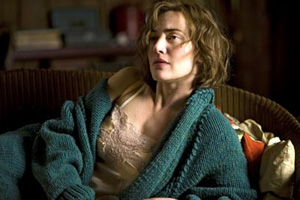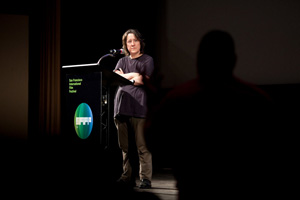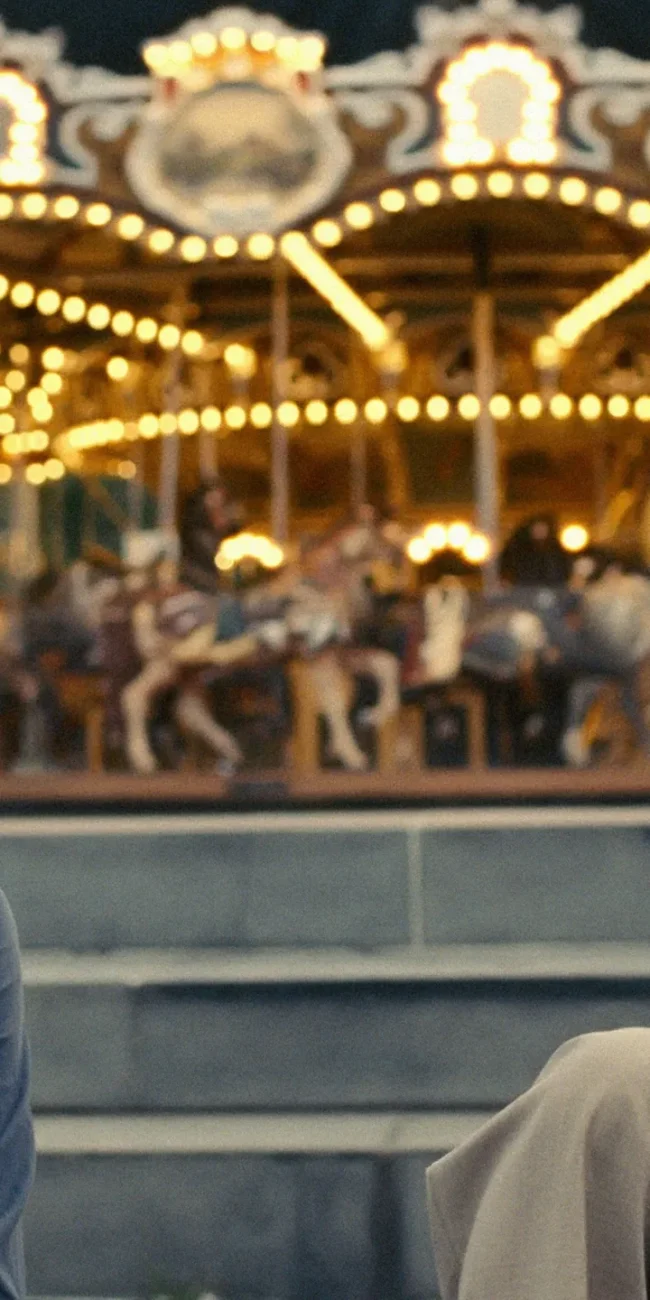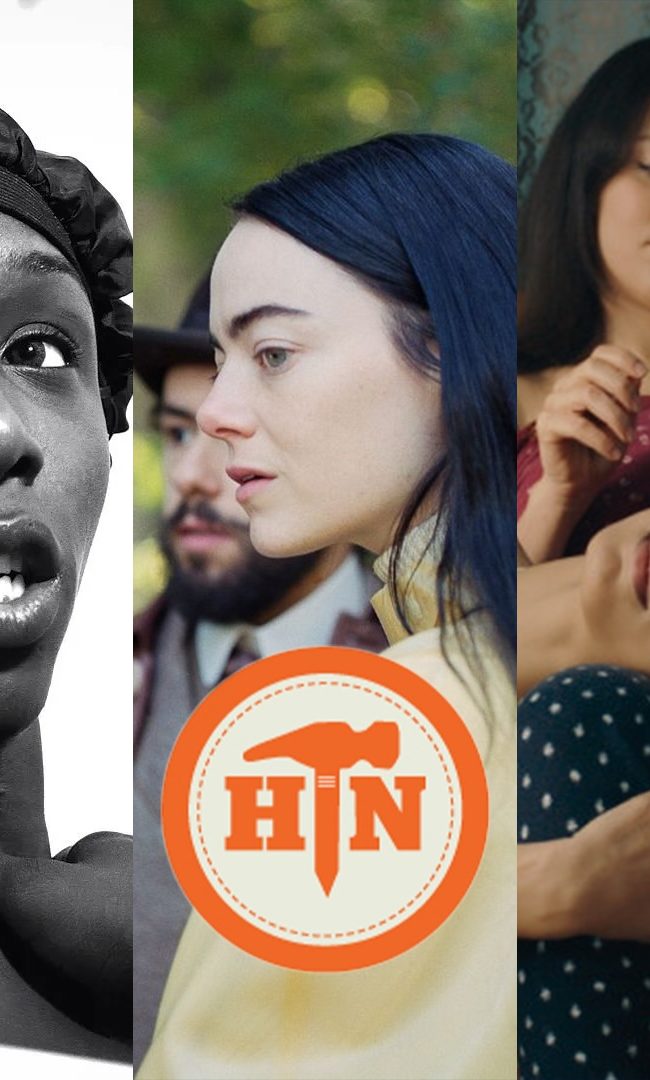THE RUMBLE IN THE RUBBLE: A REPORT FROM SFIFF 2011 – PART 2
CAVEAT VENDITOR
When producer Christine Vachon was invited to give the annual State of Cinema address (watch it here), I don’t imagine anyone expected it to play out like that time NOW invited Lauryn Hill to perform at a choose-your-feminist-issue rally and she opted to croon about not having aborted her son.
Read the room.
I wanted to wait a while to report on this event; I wanted to hear what was said about what was said. The hubbub has abated and Vachon is no longer nursing hurt feelings (“Trying to grow a thicker skin,” she said on Twitter before linking to some moderately supportive blog posts over subsequent days).
Last year I covered Walter Murch’s State of Cinema address for H2N. In that case, the stoic formality of the speaker was answered by the reverence of the audience. This year casualness was answered with casualness—and at moments barbarity was answered with barbarity.
Some reports accused Vachon of not taking the gig seriously, of being ill-prepared (one writer viciously Hillary’d her clothing). I’ll grant that if her remarks weren’t ill-considered, her demeanor certainly was. To her credit, she did try to put an asterisk on the whole thing. She confessed as she was adjusting the mic at the podium that it was midnight for her (read: “Hey, festival organizers, why couldn’t we do it at two in the afternoon like Murch did?”) and pointed out she’d been given a glass of wine (read: “Hey, festival organizers, I didn’t really need to be more relaxed for this event”), which she proceeded not to touch even as she had elaborate, apparently distressing relations with her phone.
Vachon addressed us. She congratulated herself for embracing the digital revolution early, when many were refusing to edit on Avid. “Hey, I’ve got a Steenbeck to sell ya,” she said, nudge-nudging the crowd to little effect (unfortunately when the wild-haired visionary dovetails with the shrewd opportunist, it’s hard to tell them apart). Having just produced Todd Haynes’s Mildred Pierce for HBO, this producer of over 60 films trumpeted television as “less risk-averse” than the film world.
Vachon talked about the rise of social media and mentioned that she’d just been given a contract which stipulated a set number of Twitter and Facebook performances. All I can say is that if a contract bothers with such things, your business partner is not confident in your abilities. Imagine a marriage contract in which a husband is held to taking out the trash at certain intervals.
Vachon congratulated Ed Burns and Kevin Smith for self-self-selfing their latest films—that’s my phrase, not hers, and I don’t say it that way to be demean the concept, though I wouldn’t look up to guys who were barely interesting fifteen years ago, got lost in various success-related wildernesses in the interim and are now mimicking the Kickstarting DIY clique, an industrious but suspiciously insular group (one of their number recently referred to this tent-revival-like milieu as a pyramid scheme). Incidentally, Ed Burns also talked about the value of social media while he was at the Apple store. As in Vachon’s case this must be considered an academic appraisal, as neither of them is very good at it.
“Maybe the state of cinema is not happening in a cinema,” Vachon said, brandishing the phrase as if it was the only bit she’d rehearsed and waiting for its impact. The problem is not only the murky syntax but the sentiment itself, really, at least in so far as her host was (a) a film festival (as I live-tweeted this, Don Lewis of Film Threat responded, “Did Vachon also allude to the death of the current film fest model or is that bad taste while AT a fest?”) and (b) San Francisco, a town still violently protective of brick-and-mortar cinemas. So she shouldn’t have been surprised by the shrill, combative, literally out-of-breath question that jump-started the dogpile—I mean “discussion”—portion of the event.
You can see from the photo that Vachon was defensive as soon as the first congregant engaged her, perhaps alarmed but not willing to make any concessions to these card-carrying Luddites. At this point I leaned over and whispered to my companion, “She’s here to discuss the state of cinema, not the state of San Francisco’s rep houses.” See, I’ve done filmmaker Q&As which went awry because the first question was overtly hostile and it tends to set a tone—for both questions and answers. At this point Vachon had my sympathy and I was delighted by her skewering retort: “If you want to live in 1974, you have more access to 1974 media now than anyone did in 1974.” Spurious nostalgia drives me nuts, too. But didn’t she know she was declaring war? The corporeal crowd went from low boil to rapid boil and so did the denizens of Twitter, who were following the live-tweet perpetrated almost exclusively by three people in my row.
Live-tweeter Sara Vizcarrondo (Boxoffice Magazine, Look of the Week) had been the first to provide dissent on the record, while Vachon was still mid-address. Vizcarrondo pointed out something that filmmakers drowning in the panel movement can’t see (forest/trees): how can the classic independent mandate to “make movies without permission,” a rebellious and unrepentant orientation, join hands with outreachy concepts like audience aggregation? The one thing sounds like creative compulsion harnessed to a dissenting vision, the other sounds like a “service,” to use Vizcarrondo’s revolting word.
As Vizcarrondo continued, Houston-based film critic Michael Sicinski, following along on Twitter, played Tina Fey to Vachon’s Sarah Palin.
Vizcarrondo, quoting Vachon: “‘How do you compete when I can see any movie I want for $8/month?’ Answer: ‘You have to be small, nimble, PROLIFIC.'”
Sicinski: “‘How do you compete when a bottle of aspirin costs only $5.99 at CVS?’ Answer: ‘You have to be little, yellow, DIFFERENT.'”
After Vachon revealed she’d been following the hashtag on Twitter, Sicinski retracted his personal attacks and engaged with the “odious” ideas: “Only money people have the luxury of the idiocy of staking out a nondialectical, Flintstones vs Jetsons position on this. Anyone who is laughing at the very *idea* of repertory houses, or Steenbecks, is not worth taking seriously.”
The highest-profile drama associated with the event was the confrontation between Vachon and Miranda July, whose second feature was playing down the street in the same timeslot. I doubt she was thinking, “I’ve got nothing better to do, I guess I’ll go tangle with Christine over at the Kabuki.” It seemed July was speaking on behalf of those Vachon had—occasionally brutally—dismissed already by blowing off question after question. When July began speaking, Vachon was deeply entrenched in her phone—I was surprised to find that she was listening to the question when she cut July off in a still-frustrated but now peremptory tone. These women suddenly represented two sides of an issue which seems to have dozens of sides these days. July: I want to make films and exhibit them theatrically. Vachon: Forget that model, you should be making TV.
Crazy, right?
Incidentally, I backed away from no-budget filmmaking and started toying with no-budget television about six months ago.
— Alejandro Adams















Pingback: THE RUMBLE IN THE RUBBLE: A REPORT FROM SFIFF 2011 – PART 1 – Hammer to Nail